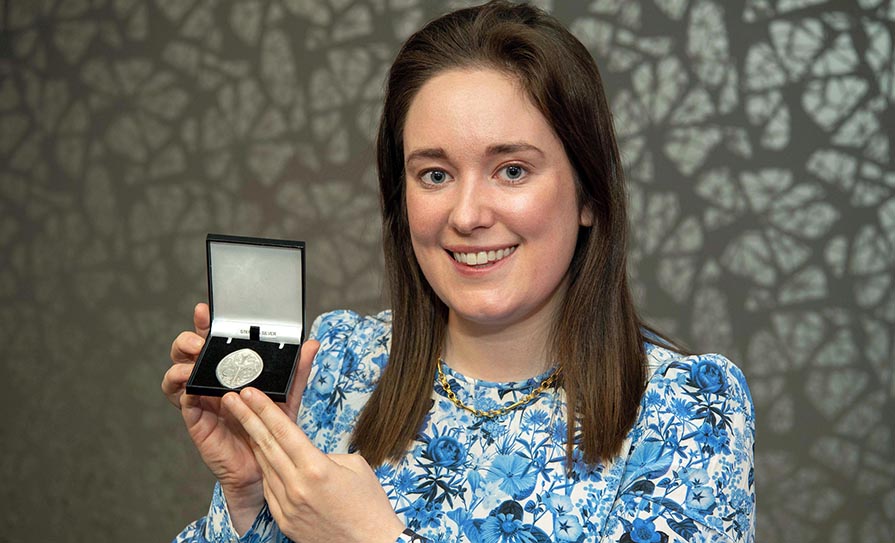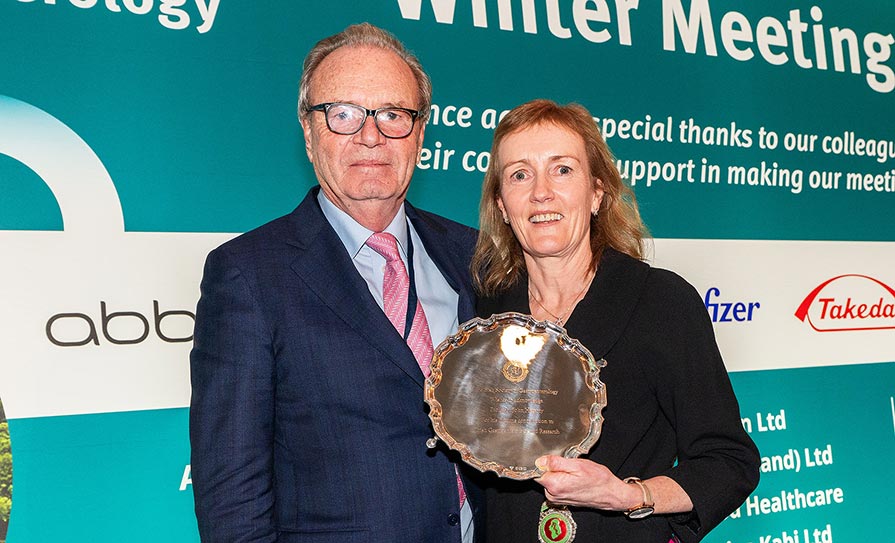Ireland has the highest reported incidence of uveal melanoma in the world, the Irish College of Ophthalmologists (ICO) 2023 Annual Conference in Killarney heard.
While rare, uveal melanoma is the most common primary intraocular malignancy in adults and represents 3-to-5 per cent of all melanomas, with a poor prognosis, Dr Alison Greene, ICO Surgical Trainee, reported during a short presentations’ session. She received the ICO’s Barbara Knox Medal for Best Paper for her presentation entitled ‘Uveal melanoma in Ireland’, reporting the clinical features and epidemiology of uveal melanoma.
The incidence of uveal melanoma varies widely according to race and region. Ireland has an incidence rate of 9.5 cases of uveal melanoma per million per year, compared to a European average of six cases per million per year, and a US average of five cases per million per year, Dr Greene revealed. A dedicated ocular oncology service exists in Ireland with a defined pathway for these patients.
Risk factors for uveal melanoma include fair skin, light-coloured eyes, congenital ocular melanocytosis, and BAP-1 tumour predisposition syndrome.
An analysis of 514 Irish cases of uveal melanoma over a 10-year period showed the majority of treatment was “globe sparing”, in line with international norms – brachytherapy (58.5 per cent), enucleation (26.7 per cent), and proton beam therapy, Dr Greene reported.
However, the risk of metastasis is high, with no treatment currently proven to reduce the risk of metastasis/improve survival in high-risk patients, though those with earlier-stage cancer treated earlier do better, she said.
Speaking during a separate dedicated clinical symposium on ocular tumours at the conference, leading international ophthalmology expert Dr Carol Shields, Director, Ocular Oncology Service, Wills Eye Hospital, Philadelphia, US, gave a very well received talk on ‘Conjunctival tumours – when to worry’. She showcased a number of clinical cases highlighting the difficulties sometimes in correctly differentiating ocular cancers from other eye conditions.
Also speaking during this session, Prof Heinrich Heimann, Consultant Ophthalmic Surgeon, Royal Liverpool University Hospital, UK, gave two presentations, highlighting when to refer cases of ocular cancer, and the latest approaches to diagnosing uveal melanoma and monitoring for recurrence and development of metastatic disease.
He stressed the importance of thoroughly investigating suspicious ocular symptoms and lesions, and the benefits of good quality OCT imaging in identifying smaller and earlier cases, which he said is particularly important given the poor prognosis of advanced uveal melanoma. Prof Heimann noted that cases of uveal melanoma picked up through diabetic retinopathy screening have a better prognosis than symptomatic cases referred for investigation. “Imaging can help you a lot in complex cases… and earlier treatment of smaller lesions improves quality-of-life and prolongs life,” he commented, adding that thoroughly assessing individual patient risk factors is also very important in relation to optimising surveillance strategies.
The final speaker in this session was Prof John Crown, Consultant Oncologist, St Vincent’s University Hospital, Dublin, who gave an update on the latest treatment approaches to metastatic uveal melanoma.
Approximately 50 per cent of patients with a diagnosis of uveal melanoma will ultimately develop metastatic disease, and treatment remains unsatisfactory, he noted.
In the majority of cases where metastasis does occur, the liver is the sole dominant site of metastasis. For patients with disease confined to the liver, different forms of liver-directed therapy such as surgery, radiofrequency ablation, chemoembolisation, or hepatic perfusion therapy can produce degrees of disease control. Hepatic perfusion therapy has been shown in a randomised trial to prolong progression-free survival and duration of hepatic progression-free survival compared to systemic treatments. However, the impact on overall survival is modest, said Prof Crown.
Metastatic uveal melanoma is far less sensitive to currently available systemic immunotherapy than is cutaneous malignant melanoma, a disease where immunotherapy has been transformative over the last decade, he told the conference. The combination of ipilimumab and nivolumab in several recent phase 2 trials has been shown to produce objective response rates of approximately 15 per cent with occasional durable remissions. More recently, tebentafusp, an immune mobilising T-cell receptor against cancer (ImmTAC), a new class of T-cell-directed treatment, has been shown in a prospective randomised trial to prolong survival compared to conventional treatments in patients with uveal melanoma where the patient has HLA-A2-01 subtype.
Increasing understanding of the molecular basis of uveal melanoma will hopefully result in novel, molecularly targeted treatments, Prof Crown concluded.
“Metastatic uveal melanoma remains a very challenging disease, with a colossal level of unmet need. We are now seeing some glimmers of hope; the first few vulnerabilities of the disease to immunotherapy and perhaps other treatments that are emerging. I am now more optimistic that we will see further advances in the future,” he told the Medical Independent.













Leave a Reply
You must be logged in to post a comment.